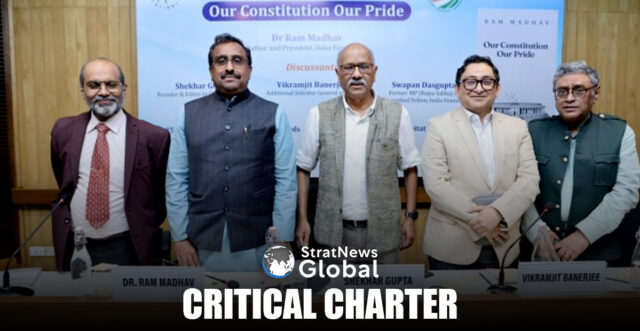The Indian Constitution serves as the cornerstone of the nation’s identity and governance, according to Ram Madhav, former National General Secretary of the Bharatiya Janata Party.
Speaking at the launch of his book Our Constitution, Our Pride at the India Habitat Centre, Madhav reflected on the document’s historical significance and its influence on India’s democratic evolution.
During his address, Madhav emphasized that the Constitution not only provides a framework for governance but also defines India’s character. “What defines India is its Constitution, because we share our geography, history, and culture with our neighbours. It is our Constitution that governs our destiny and has framed the way we have lived,” he said.
Tracing the origins of India’s Constitution, Madhav noted that the groundwork had been laid long before the Constituent Assembly was convened in 1946, and efforts to conceptualize a legal framework for an independent India had begun “at least 25 to 30 years” earlier.
The event, held at Gulmohar Hall and moderated by India Foundation Director Alok Bansal, featured an engaging discussion with prominent panelists, including The Print Editor-in-Chief Shekhar Gupta, Additional Solicitor General of India Vikramjit Banerjee, and former Rajya Sabha MP Swapan Dasgupta. The conversation delved into the Constitution’s evolution and its continued relevance in contemporary governance.
One key point of discussion was the absence of Mahatma Gandhi’s vision in the final draft of the Constitution. Madhav recounted, “At one point in the Constituent Assembly, leaders stood up and asked, ‘Where is Gandhi in this Constitution?’” He explained that while Gandhi advocated for decentralized governance, figures like B.R. Ambedkar and Jawaharlal Nehru prioritized centralized planning to drive development.
The debate also extended to Article 370, with Madhav highlighting the concerns raised by leaders over the special status accorded to Jammu and Kashmir. “Leaders questioned, ‘Why not to Awadh? Why not to Vadodara? Why only Jammu & Kashmir?’” he said, referring to the arguments presented during the drafting process.
Bringing the discussion to contemporary issues, Shekhar Gupta underscored the Constitution’s role in protecting individual freedoms. “I don’t know what holy books do, what power holy books have. But the Constitution has power. If you mess with it, it will punish you severely,” he remarked, citing recent debates over free speech, including the Kunal Kamra controversy.
Vikramjit Banerjee shed light on the judiciary’s role in shaping constitutional interpretation, pointing out that some of its most significant aspects emerged through legal judgments rather than being part of the original text. “The Constitution is not only the text. The Constitution is also how it’s being worked out. Some of the most important parts of the Constitution, including the collegium, exist not because of the original text, but because of judgment law,” he explained.
In the question and answer session that followed, panelists and attendees debated the adaptability of the Constitution in response to modern challenges.
Madhav stressed the need to uphold not only the document’s written provisions but also its underlying principles. “What is most important is not just the letter of the Constitution, but its spirit. What is needed is constitutional morality, the ability to follow it not just in words but in essence,” he said, underscoring the collective responsibility to preserve its integrity as India marks 75 years of independence.
In a career spanning three decades and counting, Ramananda (Ram to his friends) has been the foreign editor of The Telegraph, Outlook Magazine and the New Indian Express. He helped set up rediff.com’s editorial operations in San Jose and New York, helmed sify.com, and was the founder editor of India.com.
His work has featured in national and international publications like the Al Jazeera Centre for Studies, Global Times and Ashahi Shimbun. But his one constant over all these years, he says, has been the attempt to understand rising India’s place in the world.
He can rustle up a mean salad, his oil-less pepper chicken is to die for, and all it takes is some beer and rhythm and blues to rock his soul.
Talk to him about foreign and strategic affairs, media, South Asia, China, and of course India.





